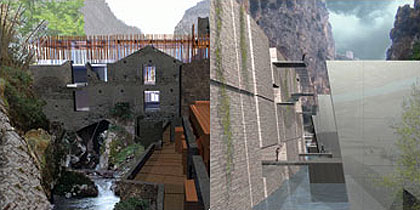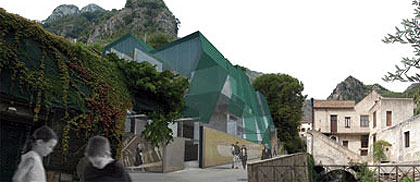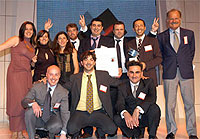Holcim Awards Competition for Sustainable Construction Development

The Holcim Awards for Sustainable Construction in Buildings Sustainable promote innovation through a series of competitions regionally and globally.
The awards, for both levels, amounts to $ 2 million for each three-year cycle of the competition.
The winners of the regional competitions, held in the central eastern Africa, Asia Pacific, Europe, Latin America and North America, were announced in September and October 2005.
With the ceremony in Geneva, September 15, 2005, were awarded the nine awards of the region Europe: the Italian projects have won awards in each of three categories (Awards, Acknowledgement, Encouragement), coming to conquer even the Holcim Awards Gold.
With nearly 400 entries from over 20 countries, one Europe presented about a quarter of all applications for participation in the world.
On April 24, in Bangkok in Thailand, was held the first global Holcim Awards ceremony, where the winners were announced global, selected from the 15 regional finalists: gold has been assigned to a project for the development and integration of ‘urban infrastructure in the vast slums of San Rafael-Unido in Caracas, Venezuela, as well as a project for a new main railway station in Stuttgart, Germany.
Silver instead was assigned to Italy, a regional master plan with a renewal strategy for the Mulini Valley near Amalfi and Scala;
The bronze was awarded to a project of housing and urban renewal cheap in Montreal, Canada.
The Awards are organized in collaboration with: Swiss Federal Institute of Technology (ETH Zurich), Switzerland; Massachusetts Institute of Technology (MIT), Boston, USA; Tongji University (TJU), Shanghai, China; University of São Paulo (USP), Brazil; University of the Witwatersrand (Wits), Johannesburg, South Africa.
Universities establish the evaluation criteria of the competition and appoint the independent juries.
The juries at regional and global level include independent experts of international standing, committed to sustainable development of society, the construction industry, building materials and design.
The next cycle of the Holcim Awards competition will open enrollment in mid-2007.
Click here for more information on the Holcim Awards.

THE PROJECT:
Waterpower – Renewal Strategy for the Mulini Valley, Amalfi & Scala, Italy
Description:
The project uses water as the central theme with the historic preservation of a number of heritage buildings and maintaining aesthetic balance between existing and new structures.
Authors:
Luigi Centola – Centola & Associati (Roma); Mariagiovanna Riitano – University of Salerno (Fisciano, Italy).
Global jury report:
The project merits distinction for its outstanding approach to enhancing the performative scope of existing structures while simultaneously exercising care in preserving the inherent qualities of the landscape.
In this respect, a global lesson is postulated in the fusion of preservation and innovation, one that is applicable at varying scales of intervention.
A high degree of finesse is exercised in coordinating a diversity of stakeholders to produce a viable model for long-term improvement of the natural and manmade environment.
Additionally, a skillful dialogue between permanence and change is established, conveying both an acute awareness of the historical evolution of the site as well as dexterity in integrating contemporary materials and technology into facilities of the past.
Yet another strength of the work lies in the critical rethinking of the conventional master plan.
An acupuncturist sensibility to renewal is promoted over wholesale reconstruction or development.
The ingenious reuse of already available resources such as existing buildings, infrastructure and water power not only promotes self-sustaining measures of contextual invigoration, but also raises awareness of the environment itself as a dynamic participant in forming a collective sense of place.
A more significant transformation in territorial value is thereby forwarded, one that promises to fortify the unique economic base of the regional culture by animating interest in the newly won identity of the valley.

![]() DOWNLOAD THE PROJECT IN PDF FORMAT:
DOWNLOAD THE PROJECT IN PDF FORMAT:
Project booklet: Waterpower – Renewal Strategy for the Mulini Valley, Amalfi & Scala (PDF, 996 KB).
